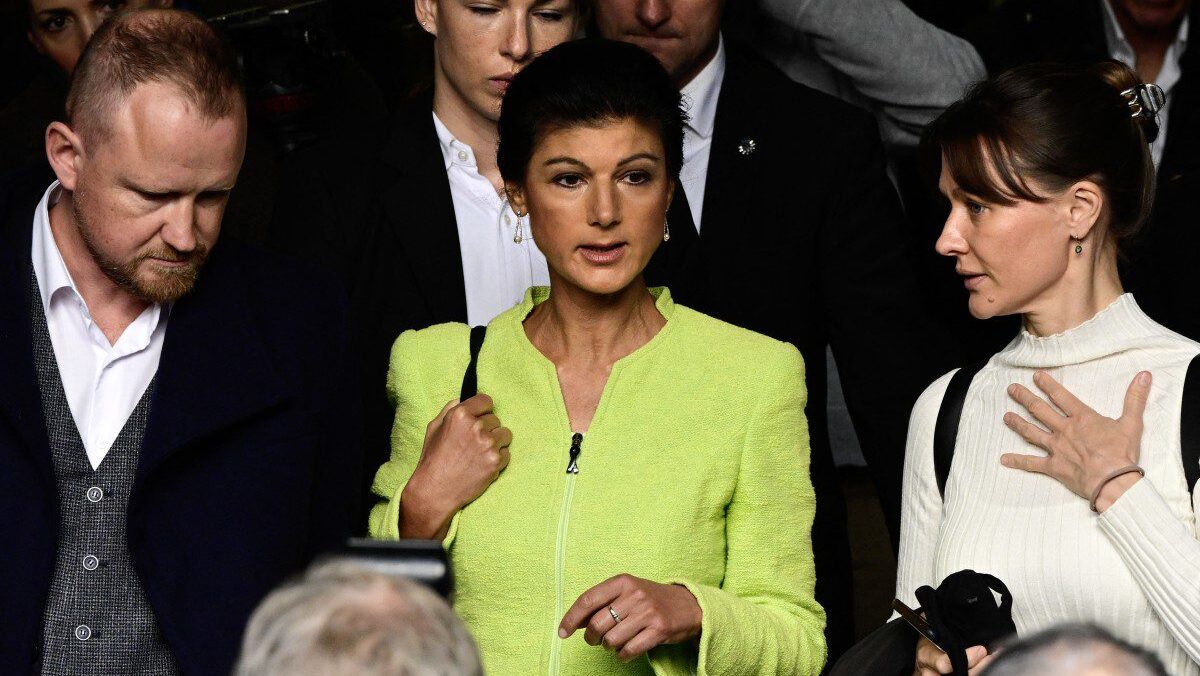
Sahra Wagenknecht (C), politician of Germany’s left-wing Die Linke party, leaves the venue after addressing a press conference about her planned foundation of a new party, on October 23, 2023 in Berlin. Wagenknecht presented her new association, called BSW for “Bündnis Sahra Wagenknecht” (Sahra Wagenknecht Alliance), conceived as the first step towards the creation of a party, probably early next year.
Photo: John MACDOUGALL / AFP
Following a great many months of speculation that she would do so, the charismatic, ever-controversial Sarah Wagenknecht, who served as a member of the German Bundestag for the hard-left Die Linke Party, has finally pulled the trigger and officially announced both her departure from the increasingly left-liberal party and plans to form a new party.
Speaking in front of a packed press conference in Berlin on Monday, October 23rd, Wagenknecht said: “We decided to found a new party because we are convinced that things cannot continue the way they are currently,” adding that “otherwise we probably won’t recognize our country in ten years.”
She slammed the policies of the old parties that have led to “unchecked migration” which she criticized for aggravating pre-existing “problems in [German] schools and especially in poorer neighborhoods.” Furthermore, Wagenknecht emphasized that the primary impetus for creating her own political party was to restore rationality in both politics and economic matters.
She argued that the reduction in industrial value creation in Germany is largely attributed to the left-liberal ‘traffic light’ coalition’s sanctions policy against Russia, and blamed the country’s international isolation on its “foreign policy of finger-wagging.”
Another fundamental aim of the party, Wagnknecht said, is to broaden the “opinion corridor” in Germany since, at present, political debate in the country is conducted in a way that “anyone who deviates from the dominant opinion bubble is quickly defamed and stigmatized.”
“That is unworthy of a democracy,” Wagenknecht declared. She also lamented the “pressure to conform” and pointed to opinion surveys that revealed nearly half of the Germans no longer dare to speak their minds out of fear of political, economic, and social retribution.
The association, called the Sahra Wagenknecht Alliance for Reason and Justice, is intended to act as a springboard to launch the new political party, which aims to field candidates for the first time in the 2024 European elections, and then in elections in the eastern states of Saxony, Thuringia, and Brandenburg later the same year.
Nine MPs from Die Linke will join Wagenknecht to form the new party, including leading members of the party like the current parliamentary group leader in the Bundestag, Amira Mohamed Ali, the Bundestag member Christian Leye, and the former managing director of Die Linke in North Rhine Westphalia Lukas Schön.
Mohamed Ali called the move “necessary and right,” and emphasized that those MPs who chose to follow Wagenknect had been “fighting for a long time to correct the course of [Die Linke] which has led it to political insignificance.”
MP Christian Leye told journalists that the new party will look for votes among “people with low and mid-range incomes, pensioners, unionists, and works council members,” adding groups such as these are presently underrepresented in German politics.
Since Die Linke, prior to Wagenknecht and the nine MPs’ defection, had 38 MPs in its parliamentary faction, and per Bundestag rules, a party must have 36 MPs to remain a faction, the left-wing party will almost surely lose its parliamentary group status in the Bundestag as a result of the split.
Wagenknecht has long been an advocate for peace with Russia and against supplying weapons to Ukraine. She is the third most popular politician in Germany, with her party potentially garnering up to 27% of the vote in federal elections, according to polls. It is worth noting that the Left Party is the successor to the SED party, which governed the German Democratic Republic (East Germany).
